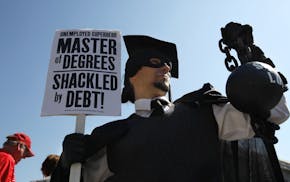The foot-stomping frenzy about debit card fees reminds me of a sandbox showdown between 2-year-olds.
In one corner we have America's banks, which seem to believe they have a constitutional right to charge merchants whatever they want to process debit card transactions.
In the other we have America's consumers, who are incredulous that banks now want to charge them for using their debit card.
Both are determined to get their way. Neither deserves to.
The tantrums erupted after the Federal Reserve -- at the behest of Congress -- reduced the "swipe" fees merchants have been forced to pay banks for processing debit card transactions. Beginning Oct. 1, it was capped at a maximum of 21 cents per transaction, plus a small percentage of sales.
The nation's biggest retailers threw all of their lobbying behind the measure, but the biggest beneficiaries might be smaller businesses that didn't have the clout to negotiate lower debit card fees.
Heartland Payment Systems, a New Jersey firm that processes payments for thousands of merchants around the country, estimates that its clients saved $1.8 million in the first 10 days of October. "Most of our merchants will save $1,000 or more in the first year," said Heartland spokeswoman Leanne Scott Brown.
Bankers, who had grown accustomed to getting their way in Washington before the financial system melted down in 2008, haven't taken kindly to losing. The new limits will reduce their fee revenue by an estimated $9 billion. TCF Bank gets about a quarter of its non-interest income from debit card fees. U.S. Bancorp, the country's No. 4 debit card issuer, has estimated it will lose about $300 million in debit-fee revenue the first year after the cap goes into effect.
Wells Fargo CEO John Stumpf, in a letter to shareholders, harrumphed about government price controls. "What's next," he asked. "Will the government require car dealers to sell a new vehicle for $5,000 or grocers a gallon of milk for 50 cents?"
Of course not, unless we are required to buy our milk from one or two retailers who charge prices based on what the farmers demand rather than what consumers are willing or able to pay.
That, in essence, is how the debit card market works.
Remember the days when most of us used checks to pay for a meal or buy our groceries? Handling all that paper was costly and time-consuming, but banks had to pay retailers or restaurants the full value of those checks.
Not so with debit cards, even though the funds come directly and often instantaneously from a checking account. On a $100 charge, the merchant might get $98 or less. The difference is eaten up by fees set and collected by Visa, MasterCard and the largest banks.
Debit cards are now the most popular form of payment -- 38 billion transactions totaling $1.4 trillion in 2009. That might suggest that the cost to merchants of accepting debit card payments has gone down over the years. Just the opposite. A Federal Reserve study estimates that debit cards cost banks about 8 cents per transaction. The charge to merchants: an average of 44 cents per transaction.
Kim Bartmann, who owns the Bryant-Lake Bowl, Red Stag Supper Club and three other restaurants in the Twin Cities, remembers when most of her customers paid by check. Now they use mostly debit cards, "and all of a sudden we're paying thousands of dollars in fees for something we never paid for before," she said. Processing charges at the Bryant-Lake Bowl alone totaled more than $60,000 in one year.
I'm not naive enough to think that the money merchants save on debit card transactions will immediately translate into lower prices at the checkout. Maybe it will, maybe it won't. When Australia imposed limits on the fees a few years ago, Australian merchants saved about $1.1 billion in the first year. But the Royal Bank of Australia said it was impossible to determine conclusively how much of the savings was passed on to consumers because so many factors affect prices.
But it's not fair to think that businesspeople like Bartmann should be paying for the frequent-flier miles your bank gave you every time you used a debit card, either.
Nor do I fault banks for deciding to charge consumers for use of their debit card. There is a cost to maintaining a customer's checking account and processing ATM and debit card transactions on their behalf. Maybe $5 a month is too much. Maybe $3 is as well. The point is, why should we expect someone else to pay for it?
ericw@startribune.com • 612-673-1736
For Thrivent and others, warnings were there

With billions in sales, some co-ops are big business

